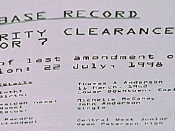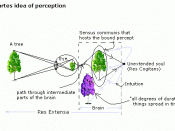1
The Matrix and Descartes
APUS PHIL 101
Professor Cynthia Lindenmeyer
Michelle Black
October 19, 2012
2
The Matrix and Descartes
The "collective hallucination" portrayed in the trilogy, 'The Matrix' by Larry and Andy
Wachowski, explores an array of philosophical concepts. Particularly prevalent questions
that are raised throughout the films include: "What is real?" and "How can I know (or arrive
at) the truth?" This paper will focus on concepts illustrated during part one of the trilogy
while examining their relationship to theories presented by the french philosopher, Rene
Descartes. Both Descartes and the film approach such questions by suggesting that the
senses can be deceitful, that it is possible to trust the mind through reasoning, and that the
attainment of wisdom is sufficient for overcoming illusions.
The Matrix clearly explores Descartes' concept that the senses and perceptions are
deceitful. Descartes subscribed to the view that our senses "provide only very obscure and
confused information" and that "judgments shall contain error" (Meditation VI). This view
derives from the fact that our perceptions are subjective; that is, an individual will uniquely
interpret his or her understanding of a given person, thing, or situation. Again, to approach
the question "what is real?" consider that "in neurobiological terms, "reality" is little more
than a representational model of the world, a construct generated by multiple neural circuits
acting in parallel. This model is based on sensory experiences received by the brain via
the senses, which can detect only the narrowest range of stimuli," (Costandi, 2006).
Therefore, the senses will react to something and then the mind follows up by examining
what is seen. Even after the articulation of one's own ideas, it is impossible to be fully
understood by another individual. The senses can be deceitful whether an interpretation
3
evokes doubt...


